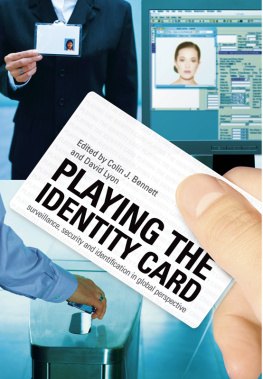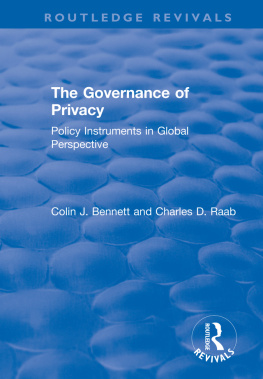Playing the Identity Card
National identity cards are in the news. While paper ID documents have been used in some countries for a long time, todays rapid growth features high-tech IDS with built-in biometrics and RFID chips. Both long-term trends towards e-Government and the more recent responses to 9/11 have prompted the quest for more stable identity systems. Commercial pressures mix with security rationales to catalyse ID development, aimed at accuracy, efficiency and speed. New ID systems also depend on computerized national registries. Many questions are raised about new IDS but they are often limited by focusing on the cards themselves or on privacy.
Playing the Identity Card shows not only the benefits of how the state can see citizens better using these instruments but also the challenges this raises for civil liberties and human rights. ID cards are part of a broader trend towards intensified surveillance and as such are understood very differently according to the history and cultures of the countries concerned.
This collection addresses a variety of issues in international and comparative perspective, bringing together articles on existing and proposed identity systems in countries around the globe as well as from the European Union and the International Aviation Authority (ICAO). The articles in the collection explore not only the technical and administrative dimensions but also the historical, international sociological and political economy perspective as well.
Colin J. Bennett is a Professor in the Department of Political Science at the University of Victoria, Canada. His research has focused on the comparative analysis of surveillance technologies and privacy protection policies at the domestic and international levels.
David Lyon is the Director of the Surveillance Project and Research Chair in Sociology at Queens University, Canada. He has been working on surveillance issues since the 1980s, and has particular research interests in national ID cards, aviation security and surveillance and in promoting the cross-disciplinary and international study of surveillance.
First published 2008
by Routledge
2 Park Square, Milton Park, Abingdon, Oxon OX14 4RN
Simultaneously published in the USA and Canada
by Routledge
711 Third Avenue, New York, NY 10017
Routledge is an imprint of the Taylor & Francis Group, an informa business
2008 Colin J. Bennett and David Lyon for editorial matter and selection; individual chapters, the contributors
Typeset in Times New Roman
by Swales and Willis Ltd, Exeter, Devon
All rights reserved. No part of this book may be reprinted or reproduced or utilised in any form or by any electronic, mechanical, or other means, now known or hereafter invented, including photocopying and recording, or in any information storage or retrieval system, without permission in writing from the publishers.
British Library Cataloguing in Publication Data
A catalogue record for this book is available from the British Library
Library of Congress Cataloging in Publication Data
A catalog record has been requested for this book
ISBN 10: 0-41546563X (hbk)
ISBN 10: 0-41546564-8 (pbk)
ISBN 10: 0-20392713-3 (ebk)
ISBN 13: 9780415465632 (hbk)
ISBN 13: 9780415465649 (pbk)
ISBN 13: 978 0203927137 (ebk)
Contents
Playing the ID card: Understanding the significance of identity card systems
DAVID LYON AND COLIN J. BENNETT
Governing by identity
LOUISE AMOORE
The elusive panopticon: The HANIS project and the politics of standards in South Africa
KEITH BRECKENRIDGE
Chinas second-generation national identity card: Merging culture, industry and technology
CHERYL L. BROWN
Hong Kongs SMARTID card: Designed to be out of control
GRAHAM GREENLEAF
A tale of the colonial age, or the banner of new tyranny? National identification card systems in Japan
MIDORI OGASAWARA
Indias new ID card: Fuzzy logics, double meanings and ethnic ambiguities
TAHA MEHMOOD
Population ID card systems in the Middle East: The case of the UAE
ZEINAB KARAKE-SHALHOUB
Separating the sheep from the goats: The United Kingdoms National Registration programme and social sorting in the pre-electronic era
SCOTT THOMPSON
The United Kingdom identity card scheme: Shifting motivations, static technologies
DAVID WILLS
The politics of Australias Access Card
DEAN WILSON
The INES biometric card and the politics of national identity assignment in France
PIERRE PIAZZA AND LAURENT LANIEL
The United States Real ID Act and the securitization of identity
KELLY GATES
Towards a National ID Card for Canada? External drivers and internal complexities
ANDREW CLEMENT, KRISTA BOA, SIMON DAVIES AND GUS HOSEIN
ICAO and the biometric RFID passport: History and analysis
JEFFREY M. STANTON
Another piece of Europe in your pocket: The European Health Insurance Card
WILLEM MAAS
Contributors
Louise Amoore specializes in the geopolitics of risk and security in the Department of Geography, Durham University, UK. She is currently leading two Economic and Social Research Council (ESRC) projects on risk and the technologies of the War on Terror: Contested Borders and Data Wars. She is co-editor (with Marieke deGoede) of Risk and the War on Terror (London: Routledge, 2008), and has published some of her recent work in Security Dialogue, Political Geography, Antipode and Transactions.
Colin J. Bennett is a Professor in the Department of Political Science at the University of Victoria, Canada. His research is focused on the comparative analysis of surveillance technologies and privacy protection policies at the domestic and international levels. He has published three books on the topic: Regulating Privacy: Data Protection and Public Policy in Europe and the United States (Cornell University Press, 1992); Visions of Privacy: Policy Choices for the Digital Age (University of Toronto Press, 1999, with Rebecca Grant); and The Governance of Privacy: Policy Instruments in the Digital Age (Ashgate Press, 2003; with Charles Raab, MIT Press, 2006).
Krista Boa is a PHD candidate at the Faculty of Information Studies, University of Toronto, Canada. Her research focuses on the development of technology-based identification systems, such as machine-readable travel documents and national ID cards, by examining the ways in which technologies are framed discursively. She is interested in how these discourses influence the design of the system and transform conceptions of identity, anonymity and privacy. Other related areas of interest which inform her research include: surveillance, access to information, and conceptualizations of privacy, particularly legal and theoretical arguments about reasonable expectations of privacy in public.
Keith Breckenridge is an Associate Professor of History and Internet Studies at the University of KwaZulu-Natal, South Africa. His current research is focused on a history of biometric registration in South Africa, and he has recently published in History Workshop and the Journal of Southern African Studies on this subject.
Cheryl L. Brown, an Associate Professor of Political Science, teaches Internet Law and Policy, Cyberspace and Politics, Digital Forensics and Policy, and Politics of China at the University of North Carolina at Charlotte in the USA. She received a National Science Foundation Award to study the formation of networks in cyberspace in the age of electronic government. Brown has conducted extensive research on information and communication technology in the Asia Pacific and published an article on smart card technology for e-government.









